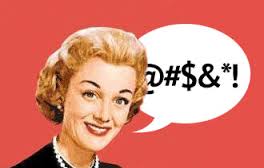When I was in the corporate world, I would release planning and budget documents to committees for review and every person would make revisions, just to show that they could, and the whole document would have to be rewritten and the cycle repeated. After a while I learned to put in a few highly questionable paragraphs with outlier ideas, bait for these compulsive committee members, who would, as predicted, gleefully strike them out, providing detailed explanations of the wisdom of doing so. I would end up with exactly the document I wanted.
I came to think of that process as “Changing ‘happy’ to ‘glad.’” If somebody went through my document and changed every occurrence of the word, “happy” to the word, “glad,” what did I care? It meant nothing. Despite committee-members’ self-important editing, the changes were cosmetic.
Recently, I had a similar experience in fiction. A potential publisher emphasized in their submission guidelines that they did not want to see obscenities in manuscripts. This presented a problem for my story of a tough, hard-drinking, foul-mouthed big city cop. But I thought, they’re just words, I’ll change them and see.
So I used global find and replace to change “shit” to “crap,” on the assumption that “crap” was not too obscene. “Fuck-ups” became “screw-ups” and “assholes” became “scumbags.” Actually I first changed “asshole” to “jerk,” because an asshole is somebody who abuses social felicity for selfish reasons. An asshole is not making an innocent social mistake, no, it’s someone who aggressively disrespects the social other for self-aggrandizement. I thought “jerk” captured that meaning fairly closely, and I made that change, but later realized that “scumbag” had the better rhythm and was close enough, even though I’m not even sure what a scumbag is. So I changed all jerks into scumbags.
I let “damn” and “hell” fly, thinking they were not technically obscene anymore, but I deleted all “Goddamn.”
Then I read through the whole manuscript, to see what I’d missed and if the changes had robbed my cop of his voice. I found a lot of small errors that needed fixing anyway, which was good, but I was surprised to notice that the sanitization of the language made essentially no difference to the character or the story. When I first wrote it with all the obscene language, I thought it was crucial to the character’s voice to talk with a foul mouth. That’s what a tough urban cop would do. But it wasn’t true.
Quinn shook his head in disgust. Rich assholes, think they’re entitled to everything.
Quinn shook his head in disgust. Rich scumbags, think they’re entitled to everything.
She thinks she’s special, but she’s just an asshole. All criminals are assholes. They know what they’re doing is wrong, but they do it anyway. Cops are supposed to stand up to that bullshit, not let it slide by.
She thinks she’s special, but she’s just a scumbag. All criminals are scumbags. They know what they’re doing is wrong, but they do it anyway. Cops are supposed to stand up to that crap, not let it slide by.
I learned that if the character’s voice is true and consistent, 99% of the vehemence comes through without using the obscenities.
“They’re just a government bureaucracy, like TPD. They fuck up, like we do. They’re not magic, despite what they think.”
“They’re just a government bureaucracy, like TPD. They screw up, like we do. They’re not magic, despite what they think.”
So in a perverse way, changing shit to crap is very similar to changing happy to glad. The changes did introduce a few problems. You write “an asshole” but “a scumbag,” not “an scumbag.” It was hard to catch all those. There were several cases where I had created a problem by going from asshole to jerk to scumbag:
“He jerked the wheel sharply to the left.”
“He scumbaged the wheel sharply to the left.”
And I didn’t know what to do with the common infix, “un-fucking-believable,” which became “un-screwing-believable,” so I just went with “unbelievable,” and there was no real loss in the character’s expression or intent.
It was a good lesson. I don’t usually swear, but I’m not comfortable writing in sanitized language when I imagine my character swears like a sailor (or a tough cop). But from this exercise I’ve learned I can always go back and clean it up with only a small loss of affect and effect. Why offend some readers when I can make them either happy or glad?


Assuming you are using MS Word, try search and replace with regular expressions to solve the problems you mention. https://support.office.com/en-us/article/Find-and-replace-text-by-using-regular-expressions-Advanced-eeaa03b0-e9f3-4921-b1e8-85b0ad1c427f
Just discovered your blog. I’m excited. Not sure if I agree about the identical voice between the two. To me, the nuance and color that can be created with judicious (or liberal) use of ‘fuck’ and its brethren can’t be duplicated by the tamer versions.
Consider a Tarantino movie that had been thus sanitized. To my ear, there’s a way criminals and certain blue-collar people *actually talk*, and you can’t merely substitute across the board that way. Of course, Breaking Bad managed to be an epic crime story, I think it lost something in not having a true palette of scatological terms for characters to use. HBO really blew it by passing on that one…
Happy Is Better Than Glad I Don’t Care What Sandra Giamberardino Says She is Not Allowed To Come In My Room